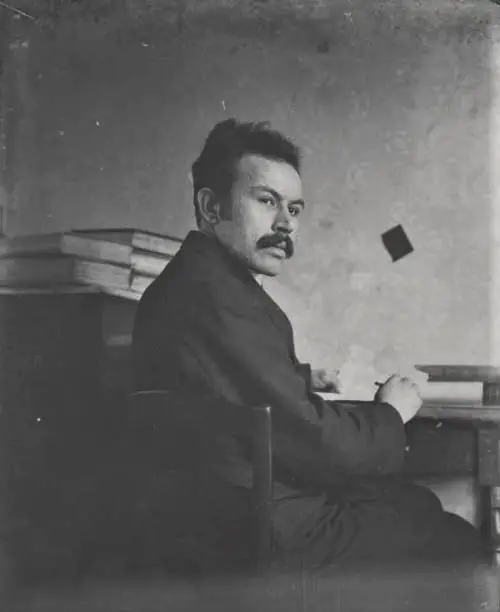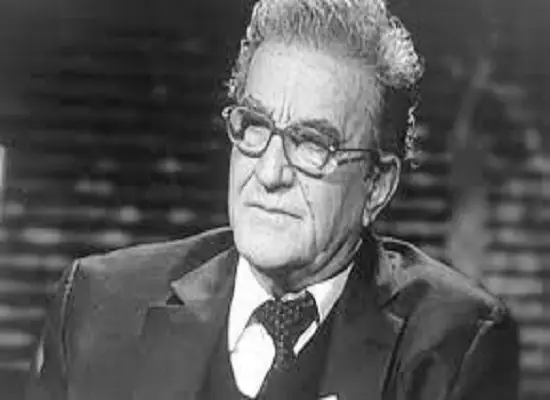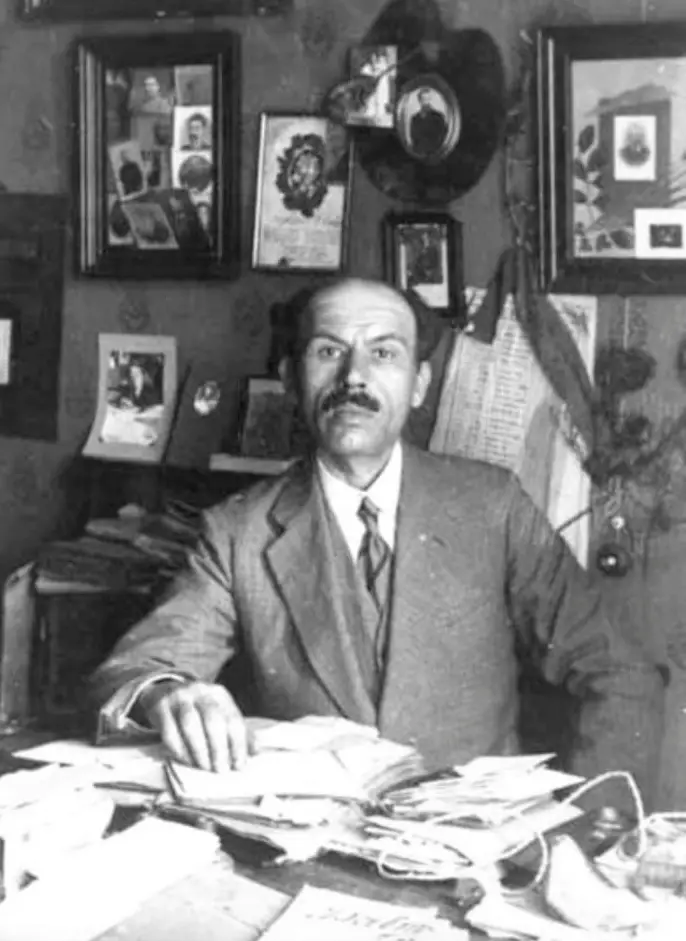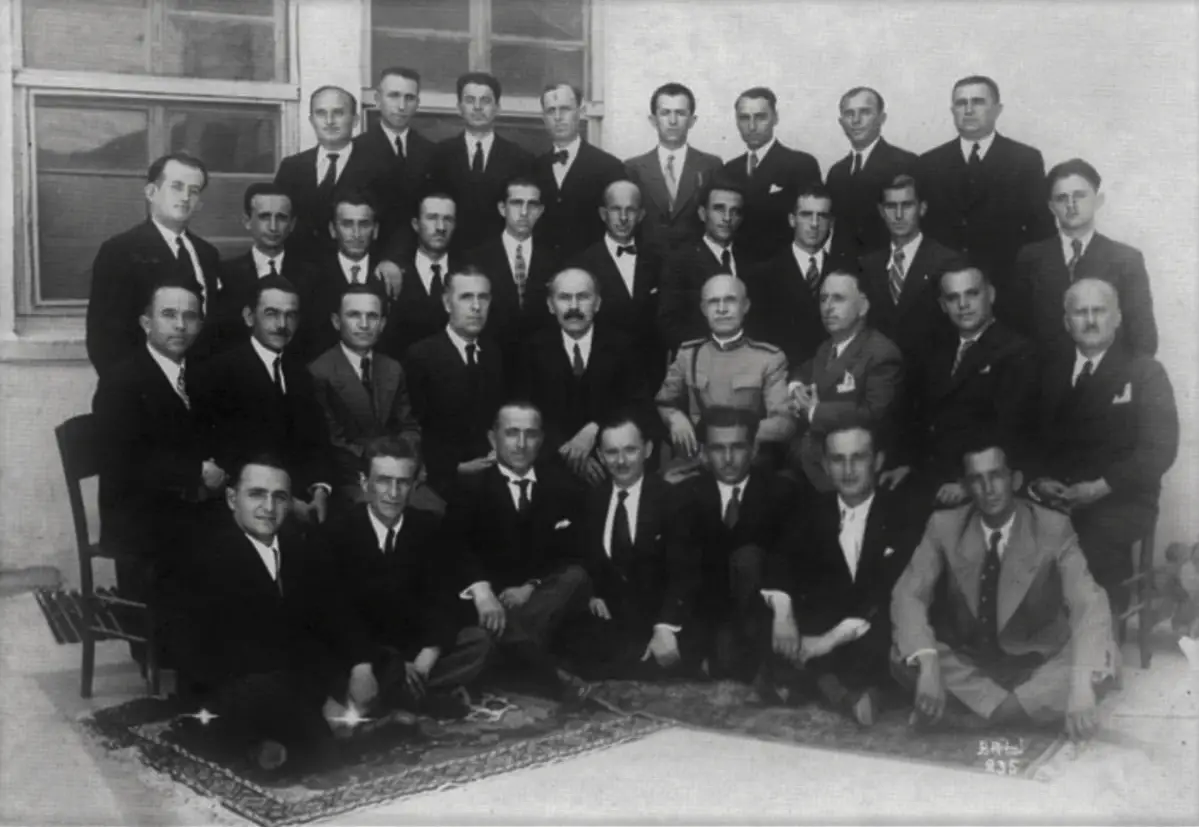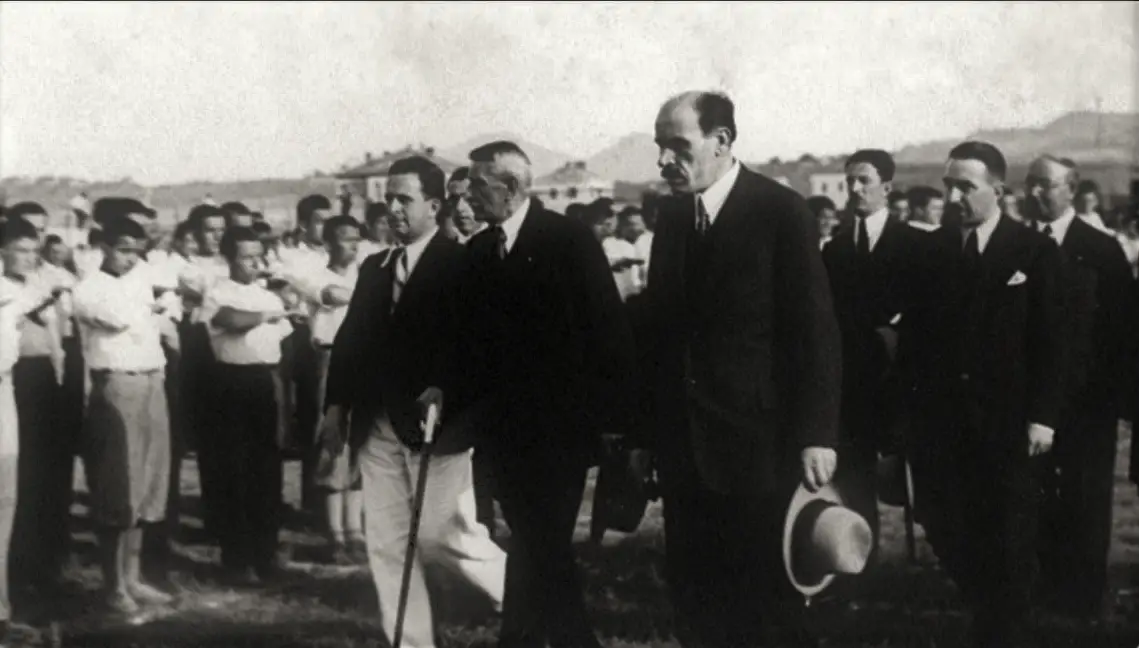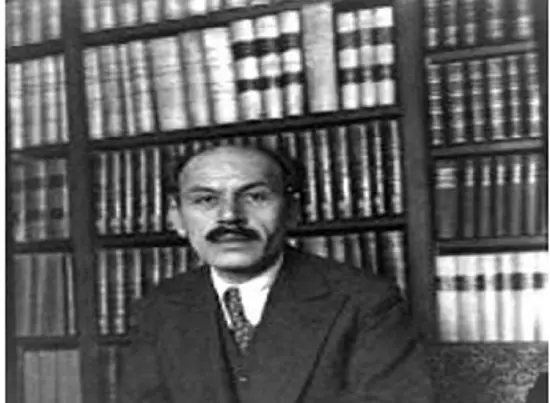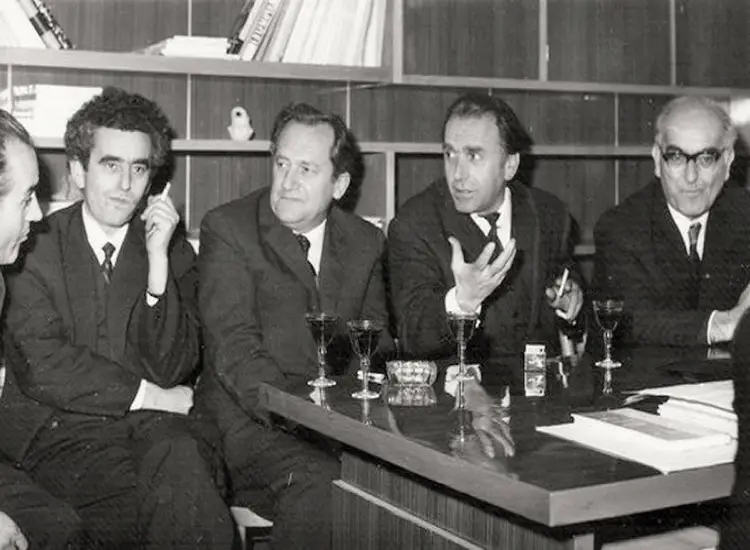By Dr. Uran Butka
The first part
Memorie.al / Mirash Ivanaj is an extraordinary personality, among the few chosen people, to strongly express himself, the cultural elite and the Albanian nation. A polyhedral figure: patriotic leader, giant of Albanian thought and action in the 1930s-’40s of the last century, creator and reformer of national education, model statesman, one of the most knowledgeable intellectuals of the time, researcher, poet, publicist, chronicler, translator, unbroken opponent of the fascist occupation of Albania and the communist dictatorship, martyr of the nation. He left his homeland together with his brother Martin Ivanaj, a prominent jurist, president of the Dictation Court, as well as his friends, the architect Qemal Butka and the philosopher Branko Merxhani, as a rejection of the Italian occupation of Albania and as a rescue for their lives. He himself explains this exile in the extraordinary diary “We, who found salvation in running away”, after the anti-Italian civil and student protests, which Mirashi also supported.
In the diary of April 4, 1939, Mirash Ivanaj wrote:
“Even today, our day and night, until after midnight, the people’s shows followed one another…! In the high school students, first of all Safet Butka, the blood of brave and martyrs, Albania and the Albanian people are reflected…”!
After six years of exile in Turkey and the Middle East, Mirashi returned to Albania. It was 1945, the tragic year of the beginning of the installation of the communist dictatorship, an anti-human, violent and bloody regime, which had used the Stalinist guillotine of beheadings, hangings, shootings, imprisonments and illegal mass deportations, to annihilate the spiritual, cultural and material heritage, as well as its bearers, prominent figures of the nation, among them Mirash Ivanajn.
The Minister of Education in 1945, Gjergj Kokoshi, an intellectual who, like Mirash, had studied in the West, a social democrat, an active participant in the Anti-Fascist War and a member of the People’s Assembly, invited Mirash Ivanaj to return from Turkey to Albania, his homeland he needed it, especially in the field of school and national education, giving his and the Albanian government’s guarantees for life and activity, although even Gjegj Kokoshi himself had not provided it, because, as is known, even he one year then he was called an “enemy of popular power”, from which he demanded a little democracy, was imprisoned and died in the terrible prison of Burrell.
The first researcher and researcher of the life and work of Mirash Ivanaj, Dr. Lazër Radi, in his work “Mysteries of a minister”, finds and cites the reasons why Mirashi returned: “I came to my homeland. The ghost of this homeland never stopped calling you. I obeyed this myth. Despite my old age, with very difficult means, dusty and worn out, so that neither I nor others recognized me, I returned to the Motherland. I do not deny that one of the reasons for my return is also books, i.e. my library…! Don’t think that I came for their value as money, not at all; I came for their scientific and linguistic value. I had some rare, even unique texts”!
In fact, as he himself claims, Mirashi did not know the situation in Albania and the danger that threatened him and his homeland. He kissed the ground at the border and after many adventures he arrived in Tirana. “All roads led me only here”, he says.
But the first painful disappointment when he expected to find his great library, documents, studies, manuscripts, but found nothing. The regime had disappeared. His properties were also seized.
An agent of the State Defense Division, a small partisan, as he says, who had not been separated from him along the road from Istanbul to Tirana, had been following him all the time he had left to live.
The state reserved a hypocritical reception. “They took me straight to the ‘Continental’ hotel. I knew this hotel well and it seemed to me that they were honoring me. Later I found out that that hotel belonged to the Ministry of the Interior and that there every movement and word was controlled and reported to the right place” – (From his conversation in prison with Gjergj Buban).
Even the dictator Enver Hoxha himself welcomed him, with feigned cordiality and cynicism. The researcher Lazër Radi gives us this conversation between them:
Enver Hoxha: – You see how well I am waiting for you, even though you cut my scholarship in France!
– I don’t remember such a thing. And if I did, it means that you were not regular in your lessons, – returned the former Minister of Education, Mirash Ivanaj.
However, the open man Mirash Ivanaj did not take it as cynicism or a threat. “Only later, in prison, did I understand the depth and vileness of this irony. Naivety is not forgiven! – He writes.
He accepted the most important and simplest task, that of a lecturer at the “Female” Institute, which he had founded himself at the time of the Bird Kingdom. And he returned to work for nearly a year with his former passion, when he was teaching at the high school in Shkodra and the one in Tirana.
Mirash Ivanaj did not know that he had entered the death lists, like hundreds of other intellectuals, who had studied in the universities of the West, and where he had graduated brilliantly in Literature and Jurisprudence. He was arrested without any reason or action, on April 19, 1947 and was cruelly tortured in custody, in the interrogator, in the judicial process, until the decision of the military court was issued on May 29, 1948, after a year of psychological and physical torture of unimaginable.
Then also in prison, where there was no shortage of insults and violence. One guard hit him with a stick, another constantly plucked the hairs of his mustache, when it is known that the mountaineers, that Mirashi himself was a proud and unbroken mountaineer.
Fellow sufferer Llambi Llambiri remembers: “When they tortured him in the cell, to force him to tell and admit his ‘crimes’, he endured them with stoicism and silence, but the beating with the stick and the bleeding by the guard, in vain, he he did not understand and could not calm down. He asked for a cigarette. It was the first time he had asked. He smoked a lot when he could find it, but it was rarely found and there was no one to bring it to him. “I often, when I was younger,” Llambi remembers, “collected the cigarette butts thrown by the guards and made some cigarettes.” I asked to give it to Mirash, but he wouldn’t accept it: You get tired, drink for yourself – and he wouldn’t take it.”
He was accused by the military prosecutor Petrit Hakani, as loyal to the Monarchy, when it is well known that Mirashi had republican ideas, strongly expressed in the newspaper “Republika”, but who also served during the time of the Kingdom for the reform of the Albanian national school, which remains one of his major works. He was accused of being an agent of imperialism, when he was an Albanian patriot who worked and sacrificed for his country. He was accused of having come from Turkey, with the idea of overthrowing the people’s power! Mirashi reacts: “Is the thought punished anywhere in the world”?!
The Military Court headed by Abdyl Haki called the charges and facts fully proven, although Mirash Ivanaj did not accept the charges and overturned them one by one with arguments and facts, and based on the infamous law 372, dated 12. 12. 1949 , sentenced him for crimes against the state to seven years in prison, loss of political rights, as well as confiscation of movable property. He also charged the court costs!
“All their accusations were slander and fiction, no truth”! – says Mirsh Ivanaj, when he was sent to prison.
It is known that the prisoners used them in intellectually and physically exhausting work. According to fellow prisoner in Tirana prison, Lazër Radi, Miraš was forced to translate military literature, especially from Serbo-Croatian or other languages. Lazar Radi, in the book “Iron Minister”, writes: “Strange, but his eyes were sparkling. It was the sight of an eagle released from a craggy mountain. His eyes did not tire even when he translated for 20 hours without a break. And it was about sixties!”
Spiritual suffering, lack of freedom, food, sufficient air, light, freezing cold and humidity, exhausting translation work, tobacco, did their work. He fell seriously ill, but there was no medicine for him, no medical service. He was locked there to work as hard as he could and to die. His friend, Lazri, stood over him and served him as best he could. Yes, Mirashi’s health was reaching the end, although he did not complain.
They exchanged some words together, and Lazri wrote them down in his mind, to write them down when he got out of prison. Here’s what he wrote: “One day, when he was changing his shirt, I noticed there was a living skeleton left, a pile of bones. But he never complained. I took him in my arms; he was light as a breath. It seemed as if his soul was suspended, neither in heaven nor on earth.”
Mitrush Kuteli, the great writer, fellow sufferer in prison of Mirash Ivanaj, who in a moment of desperation tried to cut his veins with a nail, but could not find the vein, writes – “Even when he was a little better in health, Mirash she liked to go out into the prison yard and behave like a horse in a threshing floor. The people (prisoners) looked to him like those fish out of water that, in agony, tear open their mouths to eagerly inhale some oxygen…”!
Mirash Ivanaj never knew if he was eating or not, happy or sad. When his fellow sufferers begged him to take some of the food that his family members brought, he never accepted. Professor Beqir Haçi, says that when he cut an orange into pieces, he first offered it to Mirash, but he, thanking him, did not take it. After they all took from one core, the last one remained. Only then, when everyone had taken it, for courtesy, Mirashi also took it.
“One day, in the house of suffering,” according to the memories of Jakov Miles, “Mehmet Shehu came with Bedri Spahi.” In the translation room, they also met Mirash Ivanaj. The old man respectfully stood up:
– I believe that during your time in prison you will have revised your views – Bedri Spahiu told him.
– Not my views, but my beliefs – Mirashi corrected him. – To tell you the truth: I haven’t changed anything.
Then he was none other than an old matuf – Mehmet Shehu blurted out.
“I am a thinker and a democrat who even if I were to go back in life, I would follow the same path”, he replied.
It was only when he was about to finish that he was formally taken to the prison hospital. Agron Çarçani, who suffered from the disease in a room with him, confesses in his memoirs: “He neither ate, nor drank, nor spoke. In an instant he wanted to tell me something: ‘I am finished, son! And here under the pillow I have a poem. I have kept it very carefully. If you could take it from here and if you find the opportunity, publish it, it’s simple, but it has human value:
Farewell, O life, farewell, O world
Mixed with bile, wet with tears.
His revolt and apotheosis go up to God, whom he questions:
Oh my god, how long can you put up with these things!
Who rules, tell me, these or you?
Like other prisoners before and after him, Mirash Ivanaj was allowed to die without any surgical intervention. “He died: neither in prison, nor at home, neither free nor imprisoned, neither among people nor alone at all, an absurd death, a mysterious death; he died martyred but unyielding and in a cruel silence”!
Fellow sufferer Ibrahim Hasnai, as well as former hospital laboratory technician Enis Boletini, says that the hospital found out that Mirash Ivanaj’s body was in the anatomy auditoriums of the Faculty of Medicine, as a corpse for a teaching demonstration. So he served him even to death.
Mirash Ivanaj, major figure of the nation
The apostle of Albanianism and free thought, Mirash Ivanaj, walks and does not falter on this difficult path, but not without success and in this even bloody struggle for himself, to raise the strong foundations of the main institution of the state and the main pillar of the nation, the national school, as well as the altar of free thought, for which he was martyred.
Qemal Butka, Mirash Ivanaj’s closest friend, writes in his memoirs: “We believed that the Albanian state would react strongly, because Albanians had fought against foreign invaders even when we had no state, not now. Yes, this was our illusion. Mirash Ivanaj told us that we were losing our independence and integrity, because we had previously lost our moral, cultural, institutional and economic independence”!
In his 1939 diary: “We who found salvation in running away”, Mirash Ivanaj notes:
Mirashi was kidnapped in foreign countries, in Greece, Turkey, Lebanon, Egypt, and even in Jerusalem, eating the bitter bread of the exile, which he had never desired. Skënder Luarasi confesses in his memoirs that, when Mirash Ivanaj was minister, he had created and sent to the writing exam for high school graduates in 1934, this topic:
“To the motherland, to the motherland, loyal
Try to get close to him
And conquer it with all your heart.
Here is the strong root of your power.
There, in a foreign country, he stands alone
Like a weak reed that I break”!
Mirash Ivanaj had his roots in this holy land and here he received the powers of Anteu. This is the only way to explain his strength and invincibility. Abroad, he felt abandoned and lost.
As he himself claims in court: “I am on the run abroad, together with Qemal Butka, without taking anything with me, except as you see me…! From Zogu himself, I did not receive any payment, except for a certain amount of money that was distributed to us by the state commission (from four half salaries). I was supported during the seven years of exile by the Albanian colony in Istanbul, as well as the help of Semete Xhavolli, Consul of Albania in Skopje. I have not created or participated in any political committee or organization, but we held an international protest against Greece, when it demanded our villages of Korca and Gjirokastra…”!
Mirash Ivanaj had always held strict positions against the Greek chauvinist policy towards Albania, even in emigration; he participated in a public protest against the Greek claims for Korça and Gjirokastra. But when it came to the Greek people and other peoples, he made a difference and appreciated them for their culture and history. When Greece was attacked by Fascist Italy in 1940, Mirash Ivanaj and Qemal Butka, on behalf of the Albanian emigrants in Turkey, drew up a protest, by which they condemned the Italian aggression against the Greek people, two days after its departure.
This is an expression of the solidarity of the Albanian people who have never attacked or hurt other peoples and countries, on the contrary, they have helped them in the fight for freedom and independence; it is an expression of the humanity of its worthy representatives like Mirash Ivanaj, in defense of the human and national rights of other peoples. Memorie.al
The next issue follows




